 Petzlover
Petzlover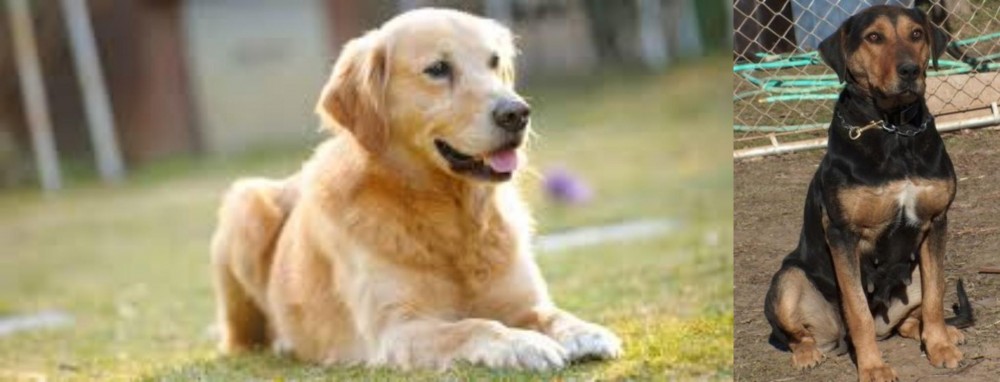 Goldador is originated from United States but New Zealand Huntaway is originated from New Zealand. Both Goldador and New Zealand Huntaway are having almost same height. Both Goldador and New Zealand Huntaway are having almost same weight. Both Goldador and New Zealand Huntaway has almost same life span. Goldador may have more litter size than New Zealand Huntaway. Goldador requires Low Maintenance. But New Zealand Huntaway requires Moderate Maintenance
Goldador is originated from United States but New Zealand Huntaway is originated from New Zealand. Both Goldador and New Zealand Huntaway are having almost same height. Both Goldador and New Zealand Huntaway are having almost same weight. Both Goldador and New Zealand Huntaway has almost same life span. Goldador may have more litter size than New Zealand Huntaway. Goldador requires Low Maintenance. But New Zealand Huntaway requires Moderate Maintenance
 Introduced as a designer dog, the Goldador is beautiful – a mix between Golden Retrievers and Labrador Retrievers, two of the most popular dog breeds in the world.
Introduced as a designer dog, the Goldador is beautiful – a mix between Golden Retrievers and Labrador Retrievers, two of the most popular dog breeds in the world.
The dog was specifically bred to be an excellent working dog, and in fact today he makes the most wonderful guide-, rescue- and therapy dog.
Known also as Golden Labradors, the Goldador is a dog that has many capabilities, one of which is to make a wonderful family pet. As a designer breed, the dog isn’t recognized as a standardized breed by any of the major kennel clubs.
 The New Zealand Huntaway was developed in New Zealand. The dog was brought about by mixing the Border Collie with a number of other breeds, of which the Doberman Pinscher is one.
The New Zealand Huntaway was developed in New Zealand. The dog was brought about by mixing the Border Collie with a number of other breeds, of which the Doberman Pinscher is one.
The idea was to have a skilled herding dog for livestock, and the Huntaway is known for its loud bark which it uses to herd.
The dog is looked upon as as a fairly new breed, dating from the late 19th century. These days it is a popular companion dog, and in 2013 was recognized by the New Zealand Kennel Club.
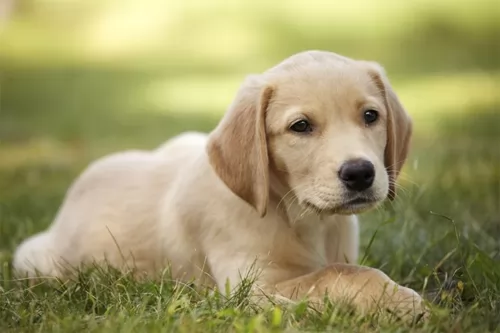 The Goldador is a large muscular dog standing at between 56 – 61cm in height at the withers and weighing between 27 – 36kg in weight.
The Goldador is a large muscular dog standing at between 56 – 61cm in height at the withers and weighing between 27 – 36kg in weight.
His double coat is short and smooth but in can also be longer. It comes in shades of gold or yellow with hints of red, but it can be liver or black too. Goldadors are well-balanced dogs, and just the look in their kind brown eyes makes you realize that this beautiful dog can make a wonderful pet.
He has a well proportioned head with medium length floppy ears, a black nose and a long tail.
Loving, intelligent, loyal and playful, the Goldador is the kind of dog that gets on well with everyone. It’s why he isn’t a particularly good watchdog as he is just too friendly with strangers. You have to be careful though – his rambunctious nature, his energy and playfulness can see him being a bit rough around small children or the elderly. It is why socialization and training are so important for him as then he becomes obedient and more relaxed around everyone.
He loves his human family and never wants to be left on his own for too long. Intelligent and alert, he is an easy dog to train as he makes it easier by being a dog that wants to please.
 As a deep chested, medium to large sized dog, the New Zealand Huntaway stands at between 50 and 60cm and weighs roughly 25 to 40kg.
As a deep chested, medium to large sized dog, the New Zealand Huntaway stands at between 50 and 60cm and weighs roughly 25 to 40kg.
The eyes are soft and kind. The coat is usually black and tan colored, although it can be brindle too. The coat is in different textures and can be mostly smooth, but also fairly rough textured. The ears are usually medium length and floppy, the legs straight and long and the tail is long.
These dogs are good natured and are guaranteed to make a splendid family pet. Because they have always been used to life in the country, they are more suited to this lifestyle than for living in the city.
They are friendly, energetic dogs and will require a good deal of exercise.They don’t take easily to lying around bored and this lifestyle will just lead to frustration and destructive behavior, through no fault of their own.
Just like with any other dog, the New Zealand Huntaway will need to be trained and socialized so that he becomes obedient and well rounded. This is necessary for him as he is an independent canine with a determined streak.
His intelligence will mean he is able to learn easily. He also is gentle and kind-hearted, and gets on well with kids and pets in the home.
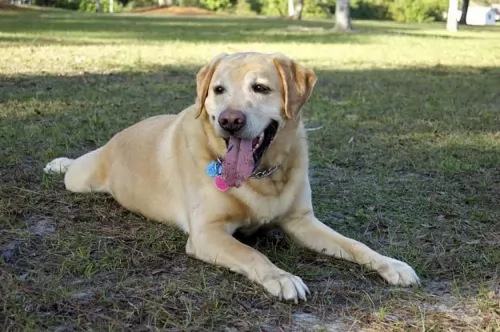 Goldadors are intelligent dogs and they’ve been used extensively for guide- and therapy dogs, loving to be useful and busy. Its the kind of dog that thrives in a loving, active family – one that counts him in as a family member.
Goldadors are intelligent dogs and they’ve been used extensively for guide- and therapy dogs, loving to be useful and busy. Its the kind of dog that thrives in a loving, active family – one that counts him in as a family member.
He makes an exceptional family pet and companion and you can rely on him to be a loyal, loving pet.It’s why the Goldador is becoming such a sought after pet – he simply ticks all the right boxes.
 The Huntaway has got so much going for him to make him a splendid family pet. Not only is he intelligent, but he is evenly balanced, friendly, social and active.
The Huntaway has got so much going for him to make him a splendid family pet. Not only is he intelligent, but he is evenly balanced, friendly, social and active.
He can easily be trained and socialized. He is friendly and gentle with other pets in the home as well as with children. With a firm, fair, kind, patient and consistent owner in his life, this dog with the gentle brown eyes will be a fantastic pet for you.
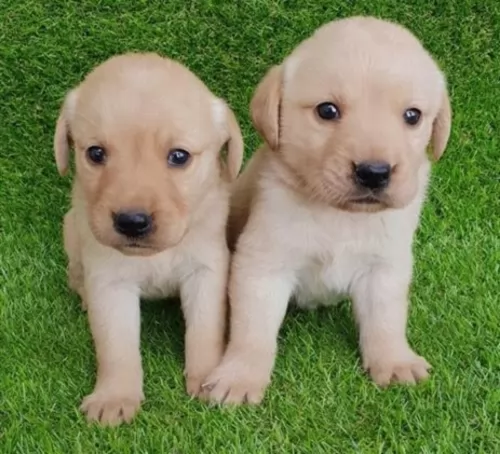 Goldadors luckily don’t have many health issues, and as a hybrid, he has fewer health issues than pure breds.
Goldadors luckily don’t have many health issues, and as a hybrid, he has fewer health issues than pure breds.
You can say with confidence that a nutritious diet, regular exercise, good grooming, lots of love and attention and visits to the vet if your pet is ill are key aspects for maintaining good health.
There are always going to be some common health problems that your Goldie could get -
You’ll need to be checking your Labrador Retriever's floppy ears. They don’t get as much air in them as a dog with erect ears. A dog like the Goldador with floppy ears will need to have his ears cleaned for bacteria. Be very careful how you clean your pet’s ears as you can damage them if you probe too deeply.
Did you know that by spaying or neutering your Goldador can save them from getting some serious illnesses later on? Speak to your vet about it when your pet reaches 9 months to a year of age.
Goldadors can easily put on weight if they aren’t given enough daily exercise to burn off the calories. Some put on weight after being spayed or neutered and it's important to watch their weight after these procedures. Being overweight puts a lot of extra strain on a dog’s internal organs.
 The Huntaway is the kind of dog that won’t require you having to rush off to the vet with him. Good care with nutritious food and exercise can see him reaching 14 years of age or so.
The Huntaway is the kind of dog that won’t require you having to rush off to the vet with him. Good care with nutritious food and exercise can see him reaching 14 years of age or so.
Some common dog illnesses to look out for include -
This disease is about degeneration of the heart muscle with the muscle becoming thinner. The pressure of the blood inside the heart causes these thin walls to stretch, resulting in the heart becoming enlarged.
Although heart disease develops slowly, severe congestive heart failure can develop quickly and you may notice rapid breathing and a blue tongue. It is imperative to get your pet to the vet immediately.
Small studies have revealed that the rate of Dilated Caridomyopathy could be higher in Huntaways.
This is an issue where the hips haven’t formed properly. Affected dogs lose their mobility and battle with pain and lameness. Certainly you will need to get your pet to the vet to make sure that he is pain-free and comfortable.
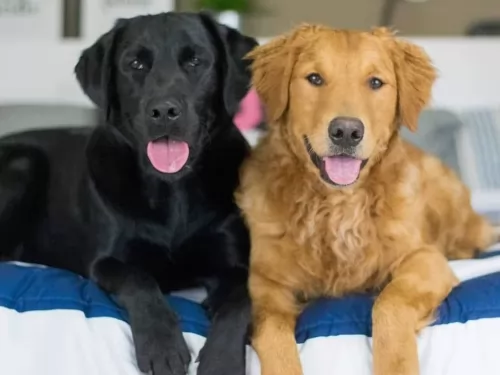 Goom your Goldador regularly. He can either have short- or long hair, but he is a fairly low maintenance dog so a good brush twice a week to remove loose hairs will be good for him.
Goom your Goldador regularly. He can either have short- or long hair, but he is a fairly low maintenance dog so a good brush twice a week to remove loose hairs will be good for him.
Diet is everything, and by giving your Goldador nutritional food, you can actually lengthen his life. If you’re going to be giving him commercially manufactured food, follow the feeding guidelines on the packaging. Remember there are foods that cater specifically for a dogs age and his energy levels.
Try and give him some home-made food from time to time such as cooked rice, vegetables and chicken as well as some raw meat occasionally as this can ensure his skin and coat remain healthy.
Always provide plenty of cool, fresh water, especially seeing that he will be thirsty after a long walk or other exercise. Dehydration in a dog can be fatal.
Provide your Goldador with a warm, dry place to sleep. Make sure that it offers shelter from the sun and rain and also provides shade.
 This dog is an average shedder and fairly low maintenance, requiring you to brush him twice a week to keep the coat shiny and free from loose hairs.
This dog is an average shedder and fairly low maintenance, requiring you to brush him twice a week to keep the coat shiny and free from loose hairs.
Dogs that have floppy- or folded ears need to have their ears checked for infection as well as their eyes. They also need to have the nails trimmed as left long, they can hook onto things which can rip into the dog’s flesh.
The Huntaway is a herding dog, and even though your dog today is more of a companion dog, he will need to be fed a high-quality commercial dog food which has been particularly formulated for active working dog breeds.
It is a good idea to sometimes break away from a bowl of kibble and to mix in some homemade food. The simpler the better for your dog, and boiled chicken, some brown rice or pasta and some vegetables such as sweet potato, carrots and spinach mixed into his kibble occasionally will do him the world of good.
Now and then you can also add in some raw meat if possible. Avoid exotic, spicy foods with your pet to avoid digestive problems.
This dog has always been a hunting, herding dog so it is going to require a lot of exercise to keep him content and happy.
He won’t only need physical exercise but will also need mental stimulation as he is an intelligent dog too. Apart from taking him for walks and giving him ball- and rope games, for mental stimulation, why not consider some food puzzle toys?
These are sturdy containers that hold dog food and treats inside. Dogs have to paw at it, lick, shake and think up ways to get at the tasty treat. These food puzzle toys will keep your pet occupied for a while and keep him happily thinking.